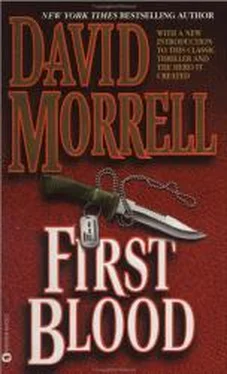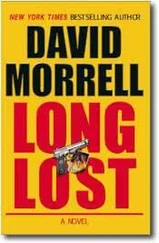Every unit was where it should be. In his mind he saw policemen and National Guardsmen strung along the edges of fields and woodlots, stamping out cigarettes, loading their rifles. They were in sections of fifty, and each section had a man with a field radio and at six o'clock the order would go down the line over the radios to move out. Still spread in a wide line, they would sweep across fields and through woods, moving in from the main points of the compass. It would take days to cover this much territory and converge in the middle, but eventually they would have him. If one group came into tangled country that slowed them, its man with the field radio would broadcast to the other groups to ease their pace and wait. That would prevent one group from slowing so much that it fell behind the main line, imperceptively shifting its direction until it was far to one side, searching an area that had already been covered by the others. There could be no gaps in the line except those which had been planned as traps, a band of men lying to catch the kid in case he tried to take advantage of that open space. The kid. Even now that Teasle knew his name, he couldn't get used to calling him by it.
The air seemed to dampen toward sunup, and he pulled an army blanket over Trautman on the floor, then wrapped one around himself. There was always something left to do, some flaw in any plan: he remembered that from his training in Korea, and Trautman had said it too, and he was going over the search from every angle for something he might have forgotten. Trautman had wanted helicopters to drop patrols on the highest peaks, from where they could spot the kid if he ran ahead of the search line. It had been dangerous lowering the patrols on pulleys in the dark, but they had been lucky and there had been no accidents. Trautman had wanted the helicopters to fly back and forth out there broadcasting fake directions to confuse the kid, and that was being taken care of. Trautman had suspected the kid would make a break south: that was the direction he had used escaping in the war, and there was a good chance he would try that way again, so the southern line was reinforced except for the intentional weak spots that were traps. Teasle's eyes were burning from lack of sleep, but he couldn't sleep, and then when he could not find any part of the plan that he had forgotten to check, he began to think about other things that he did want to forget. He had been putting them out of his mind, but now, his head starting to ache, the ghosts came of their own accord.
Orval and Shingleton. The Friday dinners week after week at Orval's place. 'A good way to start the weekend,' Mrs. Kellerman said, always phoning him at the police station on Thursday to find out what he wanted to eat the next day. In the old days she would have been phoning today, and tomorrow they would have been eating — eating what? — no, the idea of food filling his mouth was intolerable. Never Beatrice. Always Mrs. Kellerman. That was what they had decided when his father had been killed and he had gone to live with them. He couldn't bring himself to call her 'Mother,' and 'Aunt Beatrice' never sounded right, so it was always Mrs. Kellerman, and Orval liked that, having been raised to call his own parents 'Sir' and 'Ma'am.' With Orval's name it was different. Orval had been around his father's house so often that Teasle had got to calling him Orval, and the habit was hard to break. Friday dinners. She'd be cooking, and he and Orval would be outside with the dogs and then they'd come in for a drink before dinner, but Orval had given up drinking by then, so it would be just Mrs. Kellerman and himself, and Orval would have tomato juice with salt and tabasco sauce. Thinking about it now, Teasle's mouth salivated bitterly, and he tried not to think of food, thought instead of how the arguments had started and how the Friday dinners had then stopped. Why hadn't he given in to Orval? Was it really so important which way to holster a gun or train a dog that they had to argue about it? Was it that Orval was afraid of getting old and had to show that he was still as able as ever? Maybe they were just so close that every disagreement was a betrayal and they had to argue. Or maybe I was so proud that I had to show him I wasn't a kid anymore, Teasle thought, and Orval couldn't bear a stepson talking to him the way he himself had never dared talk to his own father. Mrs. Kellerman was sixty-eight. She had been married to Orval for forty years. What was she supposed to do now without him? All her life was linked with his. Who would she cook for now? Who would she have to clean for and wash clothes for now?
Me, I guess, Teasle thought.
And what about Shingleton and the shooting tournaments they had been in together, representing the department? Shingleton had a wife too, and three young children, and what was she supposed to do? Get a job, sell the house, pay for babysitters while she worked? And how am I supposed to explain to both of them about the way their husbands died? he thought. He should have phoned them hours ago, but he couldn't bring himself to do it.
His paper cup had soggy cigarette butts in the coffee. He lit his last one, crumpling the package, throat dry, thinking about his panic on the bluff, Shingleton crying, 'Look out Will! He's got me!' And then the shot and then his bolting. Maybe if he had stayed, he might have been able to get a shot at the kid, maybe if he had somehow reached Shingleton, he might have found him still alive and been able to save him. Reliving his hysterical race from the bluff, he shook with disgust. You're some tough guy, he told himself. Oh yes, a lot of mouth. And if you had it to do over, you'd do the same.
No, he thought. No, I'd die before I ran again.
The bodies up on the bluff. The state police had tried going after them with a helicopter, but from the air all the bluffs looked alike and the police had not found the right one, and finally they had been called back to help with the search. Had the rain half-covered the bodies with dirt and leaves? Were there animals nosing around them, insects crawling across their cheeks? What would Orval be like after his drop from the cliff? Galt's funeral had been yesterday morning, while he himself had been struggling across the field. He was glad that he had not been to it. He wished that he would not have to go to the funeral for all the others when at last they were found and brought back, what was left of them after several days in the forest. A mass funeral. All the coffins in a row before the altar, lids closed, the whole town there looking at him and then at the coffins and then at him once more. How was he supposed to explain to those people why it had to happen, why he had thought it best to keep the kid moving away from town, and why the kid in his bitterness had needed to defy him, both of them unable to stop pushing at each other once the thing had started?
He looked at Trautman asleep under the army blanket on the floor, and realized that he was coming to see the kid from Trautman's view. Not totally, but enough to understand why the kid had done it all, and even to sympathize a little.
Sure, but you didn't kill anyone when you came back from Korea, and you had been through almost as much as him.
But thinking that the kid should have been able to control himself was not going to revive Orval and Shingleton and the rest, and his anger at the kid for shooting Orval was too great to sustain. For the last hours his fatigue had been overpowering it. He no longer had the strength of emotion to rouse great brutal images of what he would enjoy doing to the kid.
He thought about it, and in his daze from lack of sleep, it seemed to him in a crazy way that everything had been out of control even before he and the kid had met, himself and Anna, the kid and the war. Anna. He was surprised that he had not remembered her in two days, not since the killing had started. Now she seemed farther off in his mind than California, and the pain of losing her was dwarfed by all that had happened since Monday. Still, though small, it was pain, and he did not want any more.
Читать дальше












